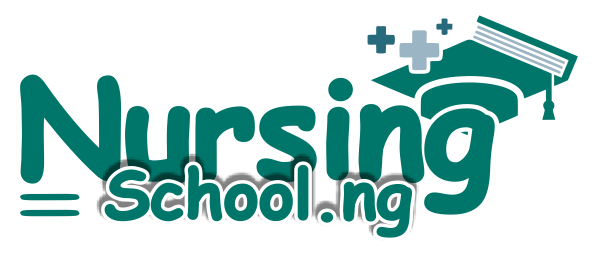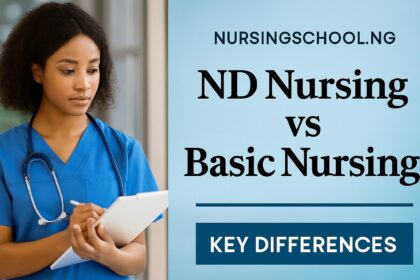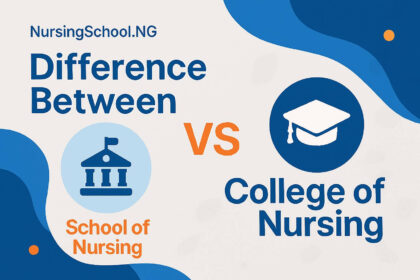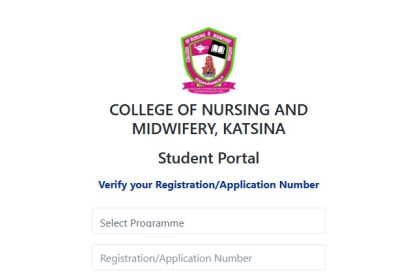If you plan to study nursing in Nigeria, you need to know the exact nursing school requirements schools and regulators expect. Nursing education is regulated by the Nursing and Midwifery Council of Nigeria (NMCN), and whether you apply to a School of Nursing (diploma route) or a university (BNSc. degree route) the paperwork, academic qualifications and professional steps are strictly enforced. This guide explains the nursing school requirements and nursing school qualifications from O’level subjects and age limits to medical fitness, registration, and the NMCN licensing process to help prospects apply with confidence.
School of Nursing (RN/RM diploma) vs University (BNSc.) Entry Paths
There are two common entry paths into the nursing profession in Nigeria:
- School of Nursing / College of Nursing (Basic Nursing Diploma / Registered Nurse — RN) usually a 3-year program. Admission is typically by the school’s own entrance exam and interview; JAMB (UTME) is not required for these diploma programs in most cases.
- University Nursing Program (Bachelor of Nursing Science BNSc.) a degree program usually lasting 4–5 years. Entry requires JAMB UTME (and meeting the UTME subject combination), or direct-entry qualifications for transfer/200-level admission. University nursing graduates have wider academic pathways for postgraduate study. Evidence from multiple university admission pages shows that BNSc. applicants must sit UTME and meet the university’s cut-off and subject requirements.
Mandatory Requirements by NMCN (Indexing, registration and the licensing exam)
All professional nursing programmes and licensing in Nigeria are overseen by the Nursing and Midwifery Council of Nigeria (NMCN). Students and graduates must be indexed and register with the Council to be eligible for the national licensing exams and eventual professional registration. The NMCN portal and exam application pages are the authoritative sources for indexing and exam procedures; applicants must follow the Council’s indexing, examination application, and registration steps.
Nursing School Requirements for Admission
For both School of Nursing diplomas and university BNSc. programs, the core academic requirement is a satisfactory O’Level result. In practice this means:
- A minimum of five (5) credit passes in O’Level examinations (WAEC, NECO, NABTEB or an acceptable NAC/board equivalent).
- The required subjects are English Language, Mathematics, Biology (or Agricultural Science where acceptable), Chemistry and Physics — usually achieved in not more than two sittings (many schools accept WAEC+NECO combos). Several schools and college pages explicitly list this 5-credit, two-sitting rule.
Note: Some post-basic or direct-entry routes (for university 200-level entry) accept OND, HND, NCE, IJMB or A-Level equivalents in approved science subjects; check the specific university for exact direct-entry criteria.
UTME / JAMB – When it’s Required and When it’s not
Most Schools of Nursing do not require JAMB/UTME for basic nursing diploma admission. They typically use their own form, entrance exam and interview. However, for University BNSc. programs, JAMB UTME is required. BNSc. applicants must choose the correct UTME subject combination (commonly English, Biology, Chemistry and Physics) and must meet the university’s UTME cut-off score many universities set a minimum UTME score (e.g., some public nursing colleges list 160 as a minimum baseline in recent sessions). Always check the university’s current admission advert.
Candidate Age and Nationality Requirements
Some schools list an age band for fresh applicants (for example, many institutions ask that applicants are between 18 and 25 by a specific intake date), while others are less prescriptive but you should expect a minimum age (usually 16–18 years) and in many cases a maximum age for fresh admission depending on the school. Some schools also require Nigerian citizenship or proof of eligibility to study in Nigeria for local intakes; always check the particular school’s admission advert for exact age and nationality rules.
Documents Requirements for Nursing Schools in Nigeria
When applying to nursing schools in Nigeria, prepare the following standard documents which are compulsory nursing school requirements (most schools require originals and photocopies):
- Original and photocopy of O’Level result(s) (WAEC/NECO/NABTEB).
- Birth certificate or sworn age declaration (schools often request this at screening).
- State of origin / Local government Area certificate (where requested).
- School leaving certificate / testimonial from secondary school.
- Passport photographs (passport–size, recent).
- Form of identification (national ID, international passport, or driver’s license where applicable).
- Medical fitness / health certificate from a recognized hospital, confirming fitness for nursing training (vaccination records may be requested).
- Application form receipt / proof of payment for the school’s application.
Some institutions may also request character references, police clearance, or additional items for hostel allocation. Because schools vary, check the specific school’s admissions page for the exact list.
Nursing School Requirements for Medical fitness, Vaccinations and Fitness to Train
Most Schools of Nursing and university nursing programs considers a medical fitness certificate as one of the compulsory nursing school requirements showing that the applicant is fit to undertake clinical training. Some schools require proof of vaccination (e.g., Hepatitis B, Tetanus, and other routine immunizations) before clinical postings. If you have a chronic medical condition, disclose it early and obtain the appropriate fitness and clearance documents from a recognized hospital. (Admissions notices and NYSC/mobilization pages commonly list medical fitness as required.)
Nursing Entrance Exams, Interviews and Selection Processes
For Schools of Nursing, selection is commonly through a school-administered entrance test and short-listing for interviews. This is usually mandatory when it has to do with nursing school requirements for admission. Entrance exams typically test English comprehension, basic science knowledge (biology, basic chemistry/physics), and sometimes general reasoning. Universities use UTME and post-UTME screening tests (paper-based or CBT) plus departmental selection. For all routes, prepare both academically and for the interview (motivation, scenario-based questions, professionalism).
Requirements for Post-graduation Licensing and Next Steps
After completing a basic nursing program or BNSc., graduates must apply for indexing and sit the NMCN licensing examination before they can be registered as professional nurses. The NMCN portal hosts the exam application, and you must have your NMCN index before applying for exams. Keep records of your training, original certificates, and NMCN correspondence as these are required at registration.
Special cases and extra pathways
- Post-Basic / Specialty programs: To enter post-basic programs you typically need an RN or RM certificate and sometimes a current practicing license; some post-basic courses also require work experience.
- Direct-entry and mature students: Universities offer direct-entry into 200-level for candidates with OND/HND/NCE/certain A-levels, while some schools run mature-student routes — check the institution’s rules.
- Foreign-trained nurses: If you trained abroad and want to practice in Nigeria, you must follow NMCN procedures for foreign-trained graduates (indexing, credential evaluation and registration), and also meet NYSC or other mobilization requirements if applicable.
Nursing School Application Checklist
Before you submit an application into any nursing school, make sure you have:
- At least five (5) credit O’Level passes including English Language, Mathematics, Biology, Chemistry and Physics, in not more than two sittings.
- Original O’Level certificate(s) and photocopies.
- Birth certificate or sworn age declaration.
- Completed application form and proof of payment.
- Passport photos and valid ID.
- Medical fitness certificate and immunization records.
For BNSc. applicants: JAMB UTME result (subject combination: English and three science subjects) and proof of meeting the university cut-off.
Frequently Asked Questions
What are the core nursing school requirements in Nigeria?
- The core nursing school requirements are five O’Level credits in English, Mathematics, Biology, Chemistry and Physics (not more than two sittings), a completed application form, passport photos, proof of age, and a medical fitness certificate. For university BNSc. programs you also need JAMB UTME with the appropriate subject combination.
Can I enter nursing school without JAMB?
- Yes. Most Schools of Nursing run basic diploma programs that admit through their own entrance exams and do not require JAMB. If you want a BNSc. degree from a university, JAMB UTME is required.
Do I need to register with NMCN before applying to nursing school?
- No — indexing and registration with NMCN typically occur after admission (or as part of graduation/licensing processes). However, you must follow NMCN indexing and exam application procedures to sit the licensing exam after your training.
What do I need for the NMCN licensing exam?
- You need an NMCN index number (issued after indexing), evidence of completed training from an approved school, and the documentation requested on the NMCN exam portal when applying for the exam.
Are there age limits to apply for nursing school?
- Some schools set age boundaries for fresh applicants (for example many adverts ask applicants to be between 18 and 25 by intake), but limits vary. Check the individual school’s admission notice for exact requirements.
Admissions requirements or nursing school requirements generally do change, and schools publish fresh instructions each session (application fees, acceptance fees and exact screening dates). Always download the official admission advert from the school, university website, or easily check our catalog, as we do ensure to keep everything up to date and cross-check against the NMCN approved schools list and the NMCN portal before applying.

















